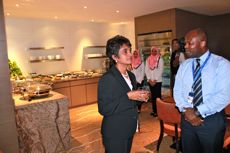The Environment Protection Agency (EPA) has blamed a surge of garbage floating in Thilafushi lagoon on “impatient” trash boats; trash which is now flowing into the sea.
In 2009, the UK’s Guardian newspaper reported that 330 tons of waste are transported in Thilafushi island for processing. Thilafushi is commonly known as ‘garbage island’.
Head of the EPA, Ibrahim Naeem, said a “huge amount of garbage” has been collecting in the ocean, due partly to a change in tides. Speaking to Minivan News today, Naeem did not want to say whether the trash was coming from resort boats, but did say the problem “involves everyone”.
“The mechanism for waste collection and disposal needs to be improved,” he said. “The EPA has to do some work on the matter, and the people who are bringing in the garbage and contributing to its buildup also need to take responsibility.”
Naeem said the EPA had photographs and names of several boats that had been dumping garbage into the sea. The agency is now investigating 10 cases.
Naeem said legal action will be taken against boats caught dumping garbage, which would affect fishing and tourism, two of the country’s largest economic contributors.
Yet there are signs that both the garbage and a lack of regulation may already be affecting tourism. In a recent interview with Minivan News, French tourist Marie Kivers noted a lack of waste bins on Male and Guraidhoo.
“It’s funny because we who live abroad think that Male’ will be an example for the world about pollution and everything, since global warming is important here. But when you see the inhabitants in the Maldives, they put anything into the sea,” she said.
Some boat captains have claimed that boats from islands, safaris and resorts dump garbage into the lagoon instead of anchoring near Thilafushi, reports Haveeru. An earlier rule stating that garbage had to be dumped before six in the evening likely contributed to the rushed habit.
Reports indicate that the waste exceeds the capacity of Thilafushi. Naeem says some boats are getting impatient.
“The facility at Thilafushi is designed so that only two or three boats can dock and dump at a time,” said Naeem. “If the waste is not removed from the area, however, or the boats take a while, other boats won’t be able to get in and dump their waste.”
The EPA has said that arrangements are being made to ensure that waste is only dumped on the island under the supervision of a council employee – a thing earlier practiced, reports Haveeru. An official also said that boats traveling to Thilafushi will be charged according to waste weight.
Thilafushi is currently the only island designed for waste disposal in the Maldives. Naeem told Minivan News that there are plans for a new site to be developed in Raa Atoll.
